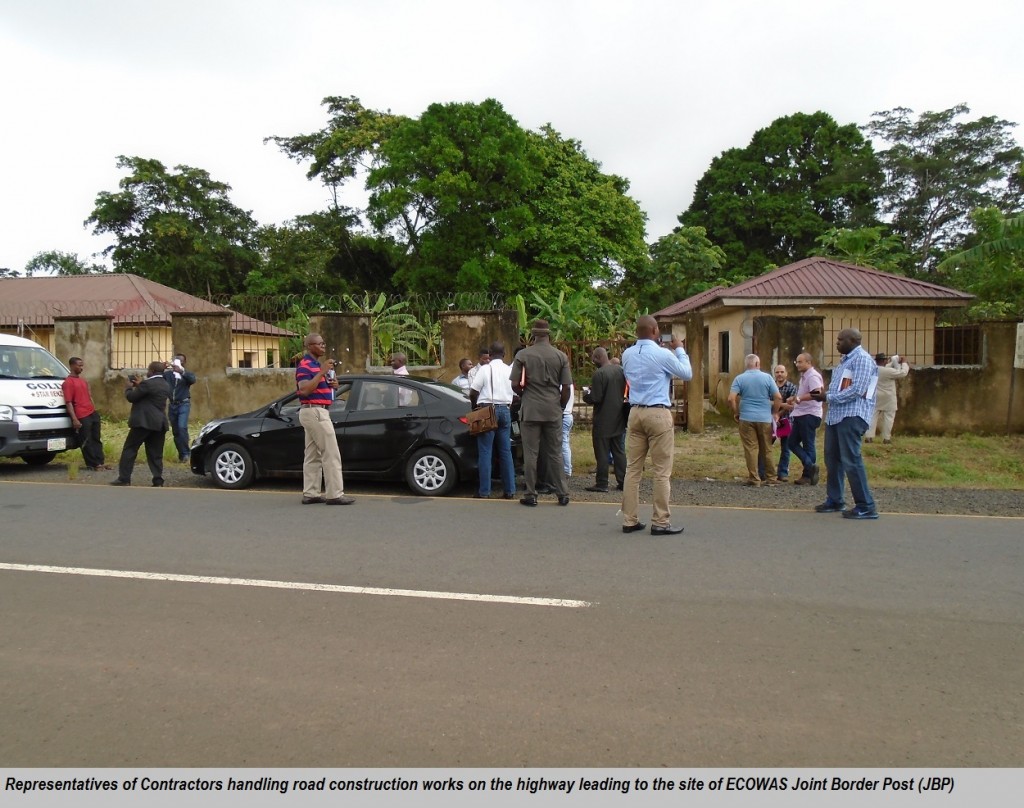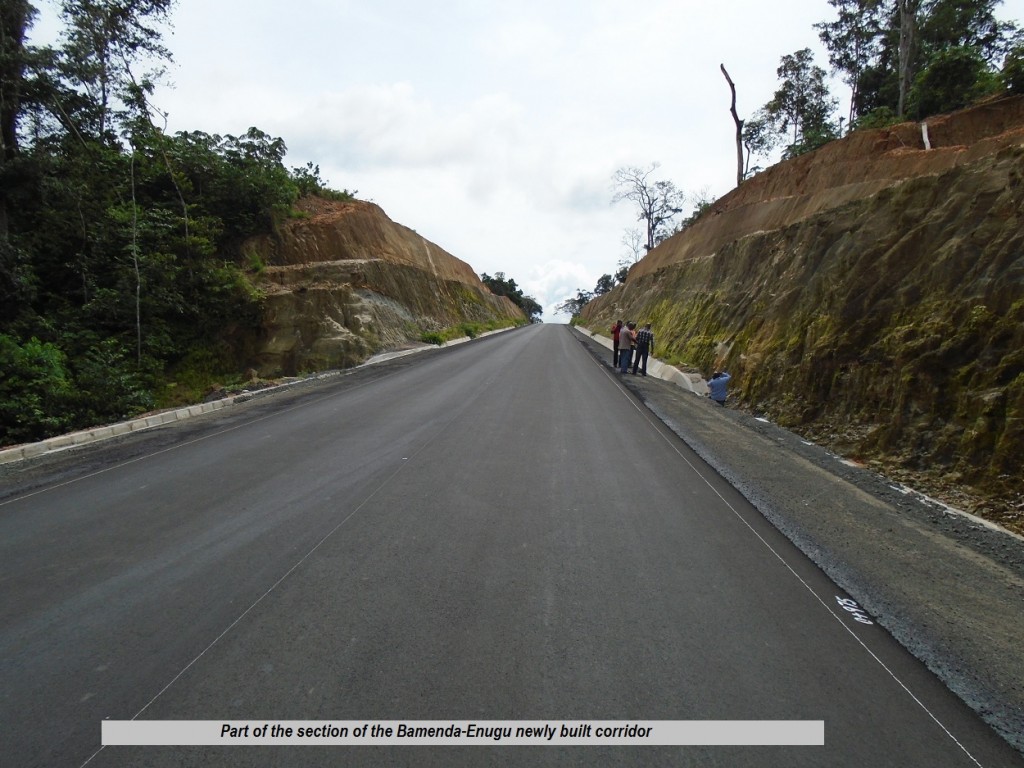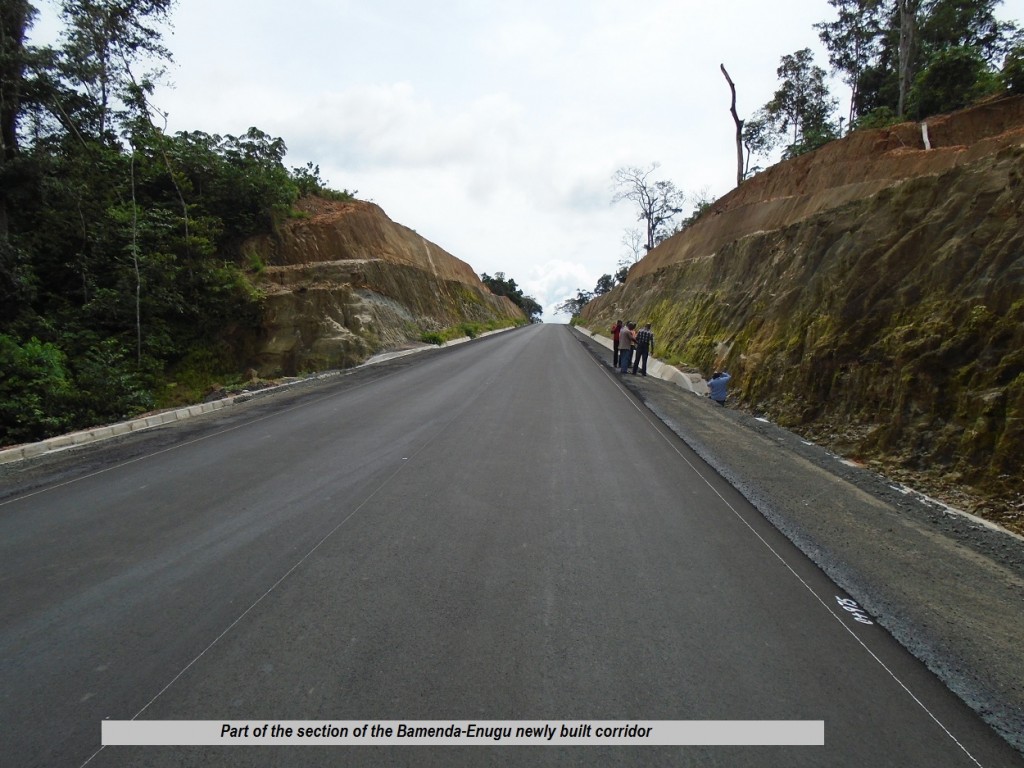High-level experts field supervision mission to Nigeria- Cameroun transport facilitation programme
|
A high-level supervision team comprising infrastructure experts from ECOWAS, Nigeria and Cameroun fielded a mission from 1st to 6th June 2015 to assess the level of implementation of the transport and transit facilitation programme on the Enugu-Bamenda corridor. The delegation, led by Ashoke Maliki, Road Infrastructure expert in the ECOWAS Infrastructure Department, also included Morro Fatty, Executive Assistant to the ECOWAS Infrastructure Commissioner, and Henry Usho, member of the Road Sector Development Team in the Ministry of Works, Nigeria. The Cameroonian delegation comprised Engineers Anyangwe Princely and Gustave Akono of the ADB/World Bank unit in the Ministry of Public Works, Cameroun. Apart from the visit to the facilities, the mission also held a meeting with representatives of construction companies on the site of a proposed Joint Border Post (JBP). Generally, the project is part of efforts to improve cooperation between Cameroun and Nigeria in the wake of the peaceful resolution of the border dispute on Bakassi, peninsula in the Gulf of Guinea which was subject of a protracted litigation between the two countries. The dispute was finally settled in a ruling delivered in favour of Cameroun in October 2002 by the International Court of Justice. In order to improve relationship , and on the initiative of the United Nations, the two countries decided to promote their trade relations by implementing this programme, which will be financed by several technical and financial partners through a loan agreement granted to the two countries and a grant to ECOWAS. The programme is split into three major components: the first, a the national component which involves the construction or rehabilitation of the Bamenda-Ekok section in Cameroun and Enugu-Mfum in Nigeria; the second, is the common effort involving the construction of a bridge on the Cross River; while the last but not the least is referred to as the regional component where a JBP is expected to be constructed at Mfum, Nigeria. The long-term objective of the project is to strengthen peace and restore confidence between Cameroun and Nigeria, ease trade between the two countries and promote regional integration by ensuring the development of closer cooperation between the two Regional Economic Communities (RECs), namely, the Economic Community of West African States (ECOWAS) and the Economic Community of Central African Republic (ECCAS). The supervision mission pointed out several achievements of the Project which, among other things, are well-constructed roads that would facilitate the movement of persons and goods, with a corresponding effect on time-saving, security and comfort of road users on each side of the Nigerian and Cameroonian borders. Similarly, concrete measures have been taken to reduce poverty among the people in the regions concerned. Awareness campaigns on malaria and HIV/Aids were also organized, not to mention the development of ties among people living on both sides of the border. A field visit has also highlighted some other developments as a result of the programme’s implementation, such as reduction in transport costs and upsurge in road traffic, including easier and more secure access to schools and health facilities, public services, markets, etc. Activities in the agricultural, housing and hotel sectors have since increased leading to a drop in unemployment, improvement of living and working conditions for women, increased income for households, and significant poverty reduction. The mission observed that, in addition to road infrastructure aimed at improving the socio-economic impact of the project, there are other proposed or on-going projects in each country, particularly the construction of weighing stations, market warehouses, agricultural products processing units, classrooms, etc. Although the construction works on the Enugu-Mfum road are complete, the level of implementation of the Cameroonian section is 92%, with assurance from the authorities to have it completed by the end of the year. In the meantime, other related construction works are at a 98% implementation rate. Studies on the common component involving the construction of a bridge in Cross River State, at the border between the two countries are almost completed, and those on the regional component, namely the construction of a JBP at Mfum, have been completed. Showing a keen interest in the project, they defined the scope of the task by taking notes and asking questions. Messrs Maliki and Fatty, staff of the ECOWAS Infrastructure Department, responded to their questions and advised them to comply with tender procedures. With the impending construction of the JBP at Mfum, ECOWAS will reinforce its experience in this sector through the maiden construction of this type of facility between one of its Member States and other countries outside its geographical region, in this context, Cameroun, a prominent member and gateway to ECCAS. To buttress these assertions ECOWAS at a Ministerial meeting in early May in the Ghanaian city of Takoradi, removed the final obstacles for the effective launch of the construction work for the Elubo/Noé JBP, at the border between Ghana and Cote d’Ivoire. Apart from the World Bank and the African Development Bank, other technical and financial contributing partners in the road corridor project between Nigeria and Cameroun are the African Development Fund and the Japanese International Cooperation Agency (JICA). |






